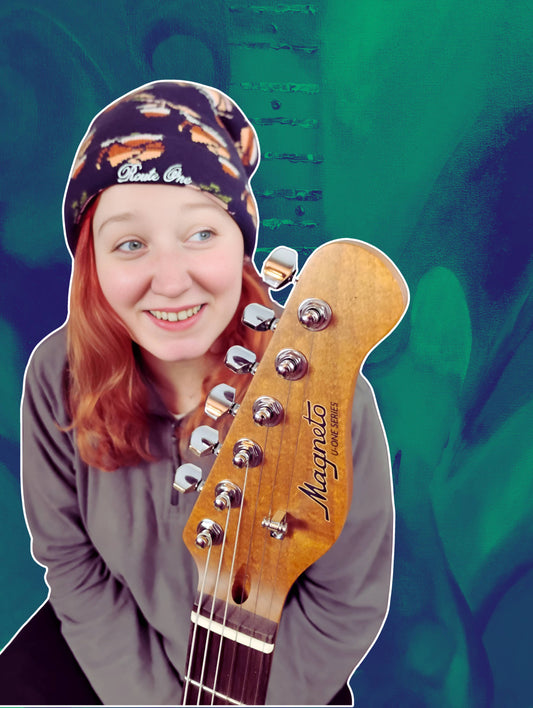
The Diamondback Kid's Non-Stop Beat Machine
Share
Meet Diamondback Kid, Portsmouth's prolific hip-hop producer shaping the city's music scene. From pirate radio to festival stages - Dan Bierton's story.
Algorithms and Amplifiers
Dan Bierton's phone never stops buzzing. Festival bookings for South Coast Ghosts. Sync briefs from production music companies, remixes, new collaborations. Welcome to the world of Diamondback Kid—a composer, producer, performer, and Portsmouth scene catalyst who's built a career on creative perpetual motion.
"Music is the only thing, aside from my kids obviously, that I really love and I am always, always working on something," Bierton explains. Between his own electrofunk/hip hop releases, fronting a 6-piece collective, running multiple side projects and producing tracks for artists across the UK, he's transformed restless creativity into sustainable artistry.

Finding Hip-Hop on the High Seas
Bierton's musical awakening began at twelve, staying up late to catch Mike Allen on Capital Radio or Tim Westwood on N-Sign Radio — an illegal station transmitting from a boat somewhere off the UK coast—introducing him to hip-hop just as the genre was filtering into Britain. For six years straight, hip-hop dominated his listening, creating the rhythmic DNA that anchors everything he produces today.
"Pretty much everything I do has a hip-hop vibe at least somewhere in it—usually in terms of the beats," he says. University brought expansion into Britpop, Orbital's electronic landscapes, Nirvana and Acid Jazz, but those original breakbeats and samples never left his system. This influence threads through his Electrofunk solo work and into South Coast Ghosts' genre-blending collective sound.
Sarm Studios: The University
Before touring consumed his life, Bierton served his production apprenticeship at the legendary Sarm Studios. The facility had hosted sessions for Frankie Goes to Hollywood, Grace Jones, Queen, and Yes, providing him with a masterclass in professional recording techniques. The studio environment exposed him to meticulous approaches to sound crafting, teaching him that production was architectural—every element serving a specific structural purpose.
These sessions immersed him in musical diversity across genres while demonstrating the gulf between competence and artistry. Working alongside seasoned engineers and producers laid the technical groundwork that would prove essential when opportunity knocked.
Three Years with Ian Brown
That opportunity arrived as a call to join Ian Brown's band, launching Bierton into what he describes as "certainly a fun time." Three years of global touring followed—European festivals, Japan's legendary Fuji Rock ("which was mental"), gigs across New York and Los Angeles, all expenses covered. Even the Brussels sprouts incident supporting Manic Street Preachers in Cardiff became a cherished war story, proving that Stone Roses royalty faced hostile crowds like everyone else.
The collaboration produced concrete creative results beyond touring adventures. Bierton co-wrote "The Gravy Train" on Brown's Music of the Spheres and "The Sweet Fantastic" from Solarized, plus created "The Boy Bierton Mix" remix of "Shadow of a Saint." Years later, hearing "Gravy Train" emanating from a Queen Vic jukebox during EastEnders created a surreal full-circle moment—pure coincidence, since he doesn't watch the show!
- While touring didn't directly enhance his studio skills, it established industry credibility and opened doors that would define his next creative phase.
From MPC to Logic: Technological Transformation
Bierton's technical evolution mirrors the industry's broader transformation. Programming drums for the track ‘So Many Soldiers’ from Ian Brown's Golden Greats plus producing full remixes for Art of Noise and Adamski in the late 90s meant that everything—beats, bass, keys, guitars, vocals—was sampled, chopped up, reprogrammed and sequenced through a single MPC2000.
"These days it's DAWs obviously—Logic being my choice—and the difference is insane cos you got everything you need to write, program, record, mix and master in a laptop," he explains. Yet fundamental techniques absorbed in late-90s studios remain relevant, core principles that transcend technological platforms. This hardware-to-software shift reflects broader industry democratization—bedroom producers now accessing tools that once required expensive studio bookings.
Multiple Projects, Unified Vision
Bierton's project roster spans creative territories: N.O.M.A.D. for fearless alternative hip-hop experimentation, APHID for collaborative vocal work, and his newest venture Cactus—a minimalist partnership with Sam Cutbush that's already released two singles with a third approaching. Each project serves distinct creative impulses while maintaining those essential rhythmic elements. N.O.M.A.D. represents pure creative freedom—"we just write shit and throw it out—there's no worries about whether anyone's gonna like it or not—cos WE do and that’s all that matters!!"
His solo Diamondback Kid releases explore Electrofunk territory, crafting dancefloor tracks that retain emotional depth. Portsmouth's music scene provides his laboratory, celebrating local talent while reaching toward universal themes. His DIY ethic often involves self-recording when session players aren't available, transforming bedroom sketches into polished releases.
The Invisible Soundtrack
"With the production music stuff, you tend not to hear it—stuff gets played all over the place and, in fact, all over the world so the chances of actually hearing stuff you've done is pretty remote," he explains. "I very, very rarely actually watch TV these days so the chances of me hearing something I've written are pretty much zero!" This commercial work demands versatility across hip-hop, breakbeat, jazz, and pop through constant brief turnover, providing financial foundation for riskier artistic ventures.
Yet he recognizes positive aspects of democratized music creation, despite concerns about market oversaturation. "There's arguments that the 'cream always rises to the top' but also arguments I think that the pool is now so saturated that the 'cream' being found amongst the millions of tracks appearing everyday has a smaller and smaller chance."
Relentless Creative Output
Bierton's productivity is uncompromising. Beyond bands and solo work, he produces tracks for Georgie Alex, Tommy Brown, and other regional artists while fulfilling production music contracts across the UK. His philosophy remains constant: "work hard, keep going and make sure there's some HipHop in there!"
Projects multiply weekly. South Coast Ghosts prepare their third album while booking festival appearances. Cactus develops minimalist material. N.O.M.A.D. continues boundary-pushing experimentation. Production music briefs arrive continuously. "Ask me again in a week and there'll probably be more going on!" he laughs.
Looking Forward
The trajectory remains characteristically hectic. South Coast Ghosts build on their Isle of Wight Festival success while completing album three. Cactus explores stripped-down collaborative dynamics. Production music contracts demand constant output across every conceivable genre.
Behind this frenetic schedule lies consistent philosophy: authentic creativity, collaborative chemistry, and those unshakeable rhythmic foundations absorbed from pirate radio broadcasts decades ago. From illegal transmissions off the UK coast to Portsmouth's thriving music community, Bierton has constructed a career on honoring early influences while refusing creative stagnation.

The Diamondback Equations: A Phase B Records Interrogation
And now some answers from the man himself..
Dan, tell us a bit about your early days. How did your early touring experiences with Ian Brown shape your approach to studio production?
Hmmm, I'm not sure the live touring did much for my studio skills but it was certainly a fun time! I spent 2, maybe 3 years touring the world - playing pretty much every European festival, stuff like Fuji Rock in Japan which was mental and gigs in New York, L.A. etc. Plus I got paid for it - good times for sure and great memories. I won't mention getting pelted with brussel sprouts when we supported the Manic Street Preachers in Cardiff!
Ok, in that case tell us a little about your time at Sarm Studios and how that's influenced your production?
Swings and roundabouts, man. We were properly taken advantage of - young lads that wanted to get into the business so we were worked into the ground - 18 hour days sometimes. Sometimes we would work 36 hours without sleep - for shitty wages. In that respect it was awful and the people running the company (no names mentioned) literally did not give a shit - it was like ‘We’re giving you an opportunity so deal with it” kinda shit.On the other hand, I got introduced to so many people, including really good friends I still have now like Rich Lowe, who does most of my mastering from Norway - he’s an absolute legend and I’ve known him now for pushing 25 years - plus other people who now run production music companies and stuff. It obviously led to me touring with Ian Brown for 3 years which was fantastic and, also, I learned a lot about recording and mixing. In fact, I did a session many years ago - a mixing session for Radiohead and I was amazed because the mix engineer came into this 48 channel SSL studio to mix a Radiohead song and he literally had about 6 stereo stems to mix from - drums, bass, gtrs, keys, vocals, backing vocals.Thats was it! The whole final track was mixed on like 6 faders and that blew my mind - and now, literally everything I do, from Ghosts to production music stuff, I bounce everything down to stems before I do the final mix. So, for every track, my final mix page will have anything from 6 to maybe 12 stems tops on the page - and that’s the mix. It’s 100% improved my mixes and it all came from that one session in probably like 1998 or something. Insane.
South Coast Ghosts, N.O.M.A.D, and Cactus all sound distinctly different yet unmistakably "Diamondback." What's your sonic signature?
It's gotta be a solid grounding in HipHop, man. I got turned on to HipHop when I was probably about 12 - it was literally just starting to filter into this country and I used to sit up and listen to radio shows like Mike Allen and, actually, Tim Westwood when he used to run N-Sign Radio which I'm pretty sure was an illegal station at the time that broadcast from a boat somewhere off the UK coast. I listened to pretty much only HipHop from 12 until about 18 when I went to Uni and a bit of Britpop, electronic stuff like Orbital and Acid Jazz started creeping in. So, yeah, pretty much everything I do has a HipHop vibe at least somewhere in it - usually in terms of the beats but - obviously there's a lyrical aspect to all three as well. You forgot to mention APHID btw...
Any particularly memorable placements where you have heard your music in unexpected contexts?
Erm, I co-wrote the Ian Brown tune 'Gravy Train' which i heard playing on the jukebox in the Queen Vic on Eastenders once. That was weird - I don't watch Eastenders btw, it was a pure coincidence! With the production music stuff, you tend not to hear it - stuff gets played all over the place and, in fact, all over the world so the chances of actually hearing stuff you've done is pretty remote. I get a list every 3 months so I know stuff I've done has been played on like Grey's Anatomy, MIami Ink - all sorts. Also, I very, very rarely actually watch TV these days so the chances of me hearing something I've written are pretty much zero! As long as it's happening though, I'm happy.
The Ghosts seem to have unlocked something special in British music. What made that project different?
Well, thanks for the compliment, but I'm not entirely sure we've taken the world by storm - not yet anyway! The Ghosts is something special mainly because of the uniqueness of the band and the way it formed - almost kinda out of nowhere. Me and Tom were working on some tunes and we did a Tommy Brown gig at the Loft on Albert Road and it just so happens that Georgie - who we didn't know at the time - was doing a little solo set at the same gig. We thought she was great and it turns out she was into the tunes we were playing so, a message or so later, she was in the band - lead singer no less! The band's gone through quite a few changes, player-wise, over the last few years but it's still got the same core vibe - a bunch of random people, totally different ages, all with their own background and roots musically - and I think that's why it's been so popular. Plus, of course, everyone in the band is a fucking legend!
How do Gen Z musicians approach music-making differently than your generation? Speaking from the point of view that some of your students have composed with you?
That's a tricky one - not really sure about that one. I'm a bit of a grumpy bastard about these chord packs and stuff where you basically drag a whole chorus part into your DAW and then you drag a whole bass part in and then a string section and shit and you got a ready made song. And don't get me started on AI vocals. I'm more of a 'why don't you actually write your own parts and play them' etc.... but I understand that it's all moving quick and it's good that so many people are now able to access music creation these days. There's arguments that the 'cream always rises to the top' but also arguments I think that the pool is now so saturated that the 'cream' being found amongst the millions of tracks appearing everyday has a smaller and smaller chance. But, yeah, I've made a few production music tracks with a lad that used to be a student of mine and he obviously has a very different approach to me - but who's to say which is best?
How has music technology evolved since your Ian Brown days, and how do you balance old-school techniques with new tools?
Jeez, man. I programmed the drums for a tune on Ian Brown's second album 'Golden Greats' - in fact I also did the programming for a remix he did of a Manics tune as well (before the sprouts incident) - and literally everything was done on an MPC2000. Actually, me and my friend Marc did a remix for the Art of Noise (this is about 1999 I reckon), plus a couple for Adamski if you remember him and the entire remixes were done in a single MPC! Beats, bass, keys, vocals - all sampled off and chopped up and programmed in like the step sequencer that the MPC had. These days it's DAWs obviously - Logic being my choice - and the difference is insane cos you got everything you need to write, program, record, mix and master (although I recommend getting a proper mastering engineer for this bit) in a laptop. It's fantastic of course but I learned a lot of techniques working in studios in the late 90s that I still employ today in the recording and mixing process, even though the situation and the hardware are worlds apart.
Your work spans multiple generations—from '90s Britpop to current streaming artists. What's remained constant in your approach?
Dude, I don't stop! Music is the only thing (aside from my kids obviously!) that I really love and I am always, always working on something. There's Ghosts, N.O.M.A.D., APHID, Cactus, my own DBK stuff of course, I've produced stuff for Georgie, Tommy Brown plus a bunch of other local artists, I write music for production music companies all over the UK. So my approach is - work hard, keep going and make sure there's some HipHop in there!
And finally - what plans or projects do you have coming next?
Err let's have a think..... I got a bunch of ongoing production music stuff - that goes from HipHop to breakbeat to jazz to pop and everything in between - that's a constant turnover kind of thing. We got South Coast Ghosts album 3 on the way - got 12 absolute bangers for that, just working through recording and stuff but that sounds great so far. Ghosts are playing IOW Festival again this year as well which is ace. My latest band thing, Cactus, is great - a little 'double act' thing with me and Sam Cutbush. We got two singles out and a third on the way. I'm sure there'll also be some N.O.M.A.D. vibes coming along at some point too - that's great cos we just write shit and throw it out - there's no worries about whether anyone's gonna like it or not - cos WE do!!I reckon that's it at the mo - but ask me again in a week and there'll probably be more going on!Peace.
Go check out more about DiamondBack Kid's work on his main page in the artists section!
You'll find tracks for sale, merch, and more about the prodigious output from possibly the most prolific music producer in Portsmouth right here!







